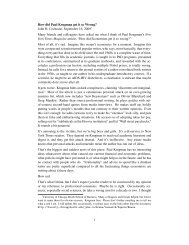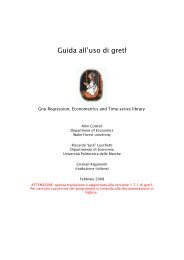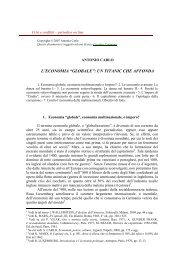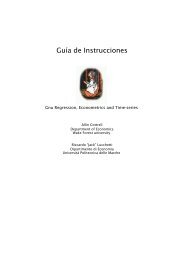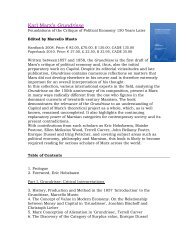The Labor Market of the Early Roman Empire - Wake Forest University
The Labor Market of the Early Roman Empire - Wake Forest University
The Labor Market of the Early Roman Empire - Wake Forest University
You also want an ePaper? Increase the reach of your titles
YUMPU automatically turns print PDFs into web optimized ePapers that Google loves.
528 | PETER TEMIN<br />
<strong>the</strong>refore, it is this absence <strong>of</strong> psychological and emotional security<br />
in slave life which <strong>of</strong>fers <strong>the</strong> key to <strong>the</strong> continuing ability <strong>of</strong> <strong>Roman</strong><br />
slave-owners to control and keep in subjection <strong>the</strong>ir slaves.”<br />
He confused <strong>the</strong> random part <strong>of</strong> <strong>Roman</strong> life, to which all <strong>Roman</strong>s<br />
were subject to a large degree, with <strong>the</strong> systematic part that motivates<br />
behavior. After all, even though getting an education carries<br />
a lot <strong>of</strong> risk even today, we urge our children to get an education<br />
to improve <strong>the</strong>ir chances <strong>of</strong> living a good life. 28<br />
<strong>The</strong> <strong>Roman</strong> incentive mechanism operated with considerable<br />
uncertainty. Some valuable <strong>Roman</strong> slaves received <strong>the</strong>ir<br />
freedom without having to pay for it, as a reward for special<br />
achievement or for noneconomic reasons. Manumission in <strong>the</strong><br />
early <strong>Roman</strong> empire was not unlike starting a new company today.<br />
Success is a product <strong>of</strong> both skill and luck; <strong>the</strong> latter can be<br />
<strong>the</strong> more important factor. Yet, success only comes to those who<br />
try, that is, those who are willing to take risks. Manumission represented<br />
<strong>the</strong> same kind <strong>of</strong> opportunity for <strong>Roman</strong> slaves. If a slave<br />
tried, both skill and luck would play a part in his eventual success<br />
or failure. <strong>The</strong> risks inherent in <strong>the</strong> process would not necessarily<br />
have discouraged many slaves. 29<br />
Freedmen were granted <strong>Roman</strong> citizenship on an almost<br />
equal basis. <strong>The</strong> well-known association <strong>of</strong> freedmen with former<br />
masters worked to <strong>the</strong>ir mutual bene t. When people engaged in<br />
trade or made arrangements for production, <strong>the</strong>y needed to know<br />
with whom <strong>the</strong>y were dealing. Information about buyers and sellers<br />
was scarce. It was mitigated partially by identifying possible<br />
customers or vendors as members <strong>of</strong> known families. Slaves, coming<br />
to freedom without a family, naturally associated with <strong>the</strong>ir<br />
former owners’ families. Because <strong>the</strong>y retained <strong>the</strong> names <strong>of</strong>, and<br />
connections with, <strong>the</strong>ir former owners, <strong>the</strong>y could be associated<br />
with <strong>the</strong>ir owners’ family. Thus were former slaves able to<br />
integrate into <strong>the</strong> economy. Moreover, a productive freeman returned<br />
<strong>the</strong> favor by increasing <strong>the</strong> reputation and income <strong>of</strong> his<br />
28 Bradley, Slaves and Masters in <strong>the</strong> <strong>Roman</strong> <strong>Empire</strong> (Brussels, 1984), 143.<br />
29 This argument can be viewed as an expansion <strong>of</strong> remarks in John R. Hicks, A <strong>The</strong>ory <strong>of</strong><br />
Economic History (Oxford, 1969): “<strong>The</strong>re are two ways in which labor may be an article <strong>of</strong><br />
trade. Ei<strong>the</strong>r <strong>the</strong> laborer may be sold outright, which is slavery; or his services only may be<br />
hired, which is wage-payment” (123). Hicks acknowledged that slavery typically is a cruel,<br />
brutal institution, but he s<strong>of</strong>tened this indictment when slaves have personal relations with<br />
<strong>the</strong>ir owners and can take economic initiative, as in <strong>the</strong> early <strong>Roman</strong> empire. “Perhaps it<br />
should be said when this point is reached, <strong>the</strong> slave is only a semi-slave” (126n.).



